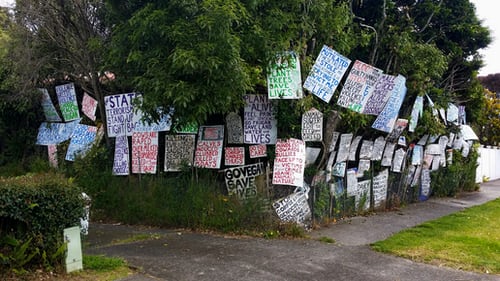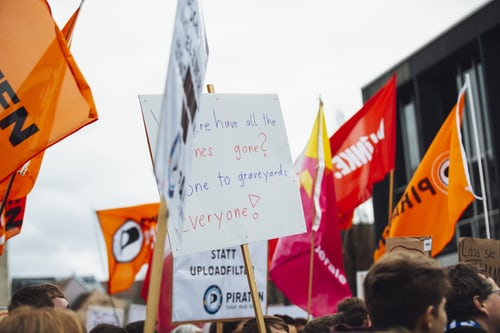Should all free people own the right to publish any opinion of their choosing, — a process which has historically served as a vital check on would-be tyrannical powers that would otherwise have risen in the absence of such rights of censure by private individuals? Or, should common sense censorship laws be expanded to enable a better cutting-off of the ability of hate groups and fake news outlets from poisoning certain demographic sectors of U.S. society, — sectors which have become increasingly ripe for indoctrination and radicalization as historic ways of American life are transformed by modernity and the diversity of peoples?
Many reasonably argue that, since the right to religious and political speech is the first right delineated in the U.S. Bill of Rights, censorship laws are inherently in conflict with the law of the land.
Yet, without censorship laws, how would we effectively cut off hate speech and the dissemination of fake news — now a multimillion industry growing exponentially each year? These groups have already poisoned our nation and continue to do so, teaching impressionable people who are often poor, rural, and marginalized to swallow deadly anti-vaccines doctrines that would deny our nation thorough safety in the face of the current deadly pandemic. Therefore, in order to advance our nation and promote the intellectual welfare of the people, common sense censorship laws must be put in place with the intention of removing toxic internet culture, saving lives, and preventing another catastrophe like the hacking of the 2016 presidential election.

Allowing the American people to consume content that includes hate speech inherently causes conflict and more hate within society, especially in our current tumultuous political climate, in which hate is beginning to explode, broiling hot within our ever and increasingly conflicted society.
Many argue that the implementation of common sense censorship laws is truly unattainable due to the political climate in the United States, where even drastic tragedies felt by the entire nation cannot persuade a government to amend and modernize the Bill of Rights.
In 2012, a 20 year old man — who freely wandered into an elementary school with a legally purchased machine gun — ruthlessly brought an end to the lives of 20 elementary bright-eyed children and six caring adults eager to start a new day of learning. Yet after this heinous tragedy, no gun laws were implemented, and no efforts were made to prevent future mass shootings. Many argue that the Sandy Hook shooting is a prime example of why common sense censorship laws will never be implemented. After such a tragedy like this, if no action was taken, why would the government take action over instances of hate speech on social media that physically hurt nobody? The current government held on to their “Second Amendment” rights even after a large group of children was killed – why would they be motivated to tighten up speech rights over instances of fake news and hate speech? The government further argues that even if common sense censorship laws were to pass the House of Representatives and Senate senate and be implemented throughout society, many extremist members of society would refuse to heed these laws and start rioting, causing chaos in society. This argument is reasonable, as the current American climate would not accept laws like this, regardless of how loosely they are constructed…

However, allowing such media to continue to be consumed perpetually exposes people to hate speech that only fuels more conversation about the ethics of hate speech, leading to more cruel and violent speech in a cycle that builds up to toxic levels in the minds of the American people.Hate speech in its nature is cruel and unnecessary, and society would be bettered in the absence of hateful and discriminatory words.
Platforms like twitter and facebook have already started banning or demonetizing users who use certain types of speech or post certain articles.
If implemented on a large scale over the U.S., this could help remove hateful speech from the daily lives of Americans. One example of this is Vox Journalist Carlos Maza, who filed harassment complaints against youtuber Steven Crowder, who repeatedly made homophobic remarks about Maza. When Maza reported the hate speech to YouTube and repeatedly called them out on their inability to support the community guidelines, rather than taking Crowder’s channel down as a whole, they simply demonetized it. Similarly, instead of implementing stringent common sense censorship rules, hate speech could be fined. In this way, Americans’ free speech is not fully taken away but much like Steven Crowder, their money is being taken away as a retribution for hateful behavior.
In the case of fake news, most people at one point or another have fallen victim to a photoshopped picture or fake news article.
Many of these pictures and articles are then shared, spreading false information. Many argue, and reasonably, that those who unwittingly re-share fake news articles without knowing they are fake could be penalized by a law that criminalizes fake news. That could be any of us. The ability of a strict law against fake news could affect the masses disproportionately due to the sheer amount of misinformation spreading through the United states at any given time. In fact, according to the Washington Post, “A 2016 Stanford study showed that 82 percent of middle schoolers couldn’t distinguish between an ad labeled sponsored content and an actual news story”. This scary statistic implements itself later in life, as even when these students grow up they gain better cognitive skills, that inability to recognize real news vs. sponsored content will manifest in their adulthood. Fake news in the United States needs to be monitored strictly and removed, and free classes should be given at town halls on how to avoid fake news. This keeps the American public safe from any laws that punish those who share fake news. Fake news needs to be monitored especially in accordance with the 2016 presidential election which Russia hacked into by disseminating fake news throughout the American continent to promote certain opinions and demote certain others. The ability for a foreign country to influence the American election is a clear indication that fake news needs to be removed from the public eye. One famous example is the pizzagate scandal, where it was claimed that democratic nominee Hillary Clinton was sexually abusing children in the basement of a pizza restaurant in Washington DC. This is obviously fake and has no basis, but many people believed this and a raid on the restaurant was even organized and planned. In the minds of certain people, this news was undoubtedly true. Pizzagate is both an example of how the 2016 election was swayed as well as an example of why fake news needs to be monitored and removed quickly before it influences naive people in the public.

Ultimately, fake news and hateful speech need to be monitored in order to keep the American people safe and prevent the swaying of elections by foreign countries again. Common sense censorship laws might be too strict for certain people, but loose versions of these laws can be made in order to compromise and set out a law that the American people will not riot against and that still complies with their first amendment rights.




